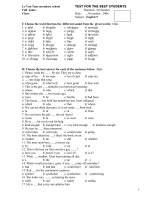BAHASA INGGRIS KEBIDANAN (ENGLISH FOR MIDWIFERY) ⌠ 1
Bạn đang xem bản rút gọn của tài liệu. Xem và tải ngay bản đầy đủ của tài liệu tại đây (1.01 MB, 31 trang )
<span class="text_page_counter">Trang 7</span><div class="page_container" data-page="7">
<b>Chapter 1 </b>
Introduction of Midwifery
In this preliminary session, the lesson will be focused on the basic structures of English that is important to learn English. The reading text used in this chapter will be more related with introduction of midwifery.
After learning this session (Chapter 1 – Chapter 3), the students are expected to :
1. To understand basic structure (Tenses) in English
2. To understand pronoun in daily English communication. 3. To understand Passive Voice in English
4. To be able to implement basic structures in the English sentences
<b>A. Structure – Tenses </b>
<b>Tenses : Masa-masa kalimat dalam Bahasa Inggris </b>
<b>Basic Tenses : Simple Present Tense, Past Tense, Simple Future </b>
Tense, Perfect Tense, Present Continuous Tense.
<b>1. Simple Present Tense </b> : Masa kalimat yang terjadi secara terus-menerus (habitual action)
</div><span class="text_page_counter">Trang 8</span><div class="page_container" data-page="8">I speak English well
When we use subjects : I, We, You, They or Plural Nouns When we use subjects : He, She, It or Singular Nouns Examples :
<b>I work in a hospital everyday </b> (+)
<b>I do not work in a hospital everyday </b> (-)
<b>Do you work in a hospital everyday? </b> (?)
<b>He writes a letter to pen pal in Africa once a week </b> (+)
<b>He doesn’t write a letter to pen pal in Africa once a week (-) Does he write a letter to pen pal in Africa once a week ? (?) 2. Past Tense </b> : Masa kalimat yang terjadi dimasa
lampau dan tidak ada kaitannya pada saat dibicarakan.
S + V2 (past) + Object/Adverb (+)
S + did not + V1 (present) + Object/Adverb (-) Did + S + V1 (present) + Object/Adverb (?)
I studied in Medical Institute.
<b>3. Present Future Tense </b> : Masa kalimat yang terjadi dimasa mendatang.
<b>S + Verb (present) + Object / Adverb </b>
<b>S + do + not + verb (present) + Object/Adverb S + Verb (present) + s / es + Object / Adverb S + does + not + verb (present) + Object/Adverb </b>
</div><span class="text_page_counter">Trang 9</span><div class="page_container" data-page="9">Formula :
S + will/shall + V1 (present) + Object/Adv (+) S + will/shall not + V1(present) + Object/Adv (-) Will/Shall + S + V1 (present) + Object/Adverb (?) Example :
I will study in Medical Institute.
<b>4. Present Perfect Tense </b> : Masa kalimat yang terjadi dimasa lalu dan masih terjadi pada saat dibicarakan.
Formula :
S + have/has + V3 (past participle) + Obj/Adv (+) S + have/has not + V3 + Object/Adverb (-)
Have/Has + S + V3 + Object/Adverb (?) Example :
I have studied in Medical Institute.
<b>5. Present Continuous Tense : Masa kalimat yang sedang </b>
terjadi dimasa sekarang Formula :
S + tobe (are, am, is) + Verb-ing + Obj/Adv (+)
S + tobe + not + Verb-ing + Object/Adverb (-) Tobe (are, am, is) + S + Verb-ing + Obj/Adv (?)
</div><span class="text_page_counter">Trang 10</span><div class="page_container" data-page="10"><b>What Is Midwifery </b>
The simplest definition of midwifery is "with woman", but truly, midwifery means different things to different people. For many, the Midwifery Model is an attitude about women and how pregnancy and birth occur, and view that pregnancy and birth are normal events until proven otherwise. It is an attitude of giving and sharing information, of empowerment, and of respecting the right of a woman and her family to determine their own care.
The attitude of midwifery, or the Midwifery Model can be contrasted with the Medical Model. In general, the Medical Model is an attitude that there is potential pathology in any given situation, and that medicine can assist to improve the situation. Medicine is also about teaching, informing, and prevention, but the power seems to be more with the provider rather than with the woman.
Historically, midwives have always been around to help women give birth. Before physicians, midwives were the primary healers in their communities. They were the medicine women of their own cultures, and assisted families and women throughout their lives. In the Old Testament they were described as examples of the strength and faith in God.
Midwives were once the nutritionists, herbalists, doctors, ministers, counselors all rolled into one 'profession'. Many feel they were the first holistic practitioners. Midwives were always available to help the poor, the women without medical care or the women who were the outcasts of their culture. Today, midwives take care of anyone who wishes to see them, but practice within the constraints of their medical and legal systems.
Today midwives are as diverse as the populations they serve. Midwives are willing to take care of anyone who wishes to see them. Over 70% of births in the world are attended by midwives. In the Netherlands, midwives deliver a majority of the babies. Other countries do not utilize midwives to their
</div><span class="text_page_counter">Trang 11</span><div class="page_container" data-page="11">fullest potential. Each country worldwide has a slightly different view of midwifery, and of how midwives work within their communities. Midwives are encouraged to share their statistics and work situations within this newsgroup.
The World Health Organization (WHO) presents us with the following definition of the midwife:
<i>A midwife is a person who, having been regularly admitted to a midwifery educational program, duly recognized in the country in which it is located, has successfully completed the prescribed course of studies in midwifery and has acquired the requisite qualifications to be registered and/or legally licensed to practice midwifery. (WHO, FIGO, ICM Statement) </i>
<i>Exercises : </i>
1. Translate the above reading into Bahasa Indonesia! 2. Give underlines for the tenses that you know! 3. How is your opinion about midwives in Indonesia?
</div><span class="text_page_counter">Trang 12</span><div class="page_container" data-page="12">
Chapter 2
Profession Related To Childbirth
In second session or Chapter 2, the lesson will be continued with the next structures of English that is also important to understand English better. The reading text used in this chapter will be more related with the Profession Related To Childbirth.
<b>A. Structure 1. Pronoun </b>
<b>Pronoun is a word which takes the place of noun in a sentence. Personal Pronouns are used instead of repeating the names of </b>
people. Following is the list of personal pronoun as subject and possessive adjective :
<b>Subjective Possessive Adjective Singular Plural Singular Plural </b>
She wrote a letter to her brother in Paris. We invited them to come to my party
</div><span class="text_page_counter">Trang 13</span><div class="page_container" data-page="13"><b>Pronoun (Kata Ganti Orang) </b>
<b>Subject Object Poss. Adjective Poss. Noun Reflexive Pronoun </b>
They them their theirs themselves
<b>Example : </b>
I myself want to prepare my examination in Medical Institute.
<b>Relative Pronoun </b>
<b>Relative Pronoun : Kata ganti penghubung 2 kalimat (who, </b>
whom, whose, which).
<i>Example of relative pronoun for people/human (whom, who, whose):</i>
Who : He is the man who work in that medical clinic. Whom : He is the man whom I talked to yesterday Whose : He is the man whose wife is the a midwife in birth center.
<i>Example of relative pronoun for non-person/things/place : </i>
Which : We need some papers which are used for the meeting
When : I don’t know when you will visit the patient Where : She don’t know where you live in this city. What : They will not understand what to do How : Anita doesn’t think how to come there
</div><span class="text_page_counter">Trang 14</span><div class="page_container" data-page="14"><b>Conditional </b>
<b>Conditional : Kalimat pengandaian / perumpamaan dari </b>
kejadian yang sebenarnya
<b>Type 1 (Real Conditional) </b>
Formula :
If + simple present, S + will/shall + V1 + Object/Adverb Example :
If she come early, she will not come late
<b>Type 2 (Unreal Conditional) </b>
Formula :
If + past tense, S + would/should + V1 + Object/Adverb Example :
If she came this morning, she would not come late
<b>Fact </b> <i>: She doesn’t come in the morning, so she comes late </i>
<b>Type 3 (Impossible Conditional) </b>
Formula : If + past perfect, S + would/should + have + V3 + Object/Adverb
Example : If she had come since two days ago, she would not have come late.
<b>Fact </b> <i>: She didn’t come two days ago, so she came late </i>
<b>Gerund </b>
<b>Gerund : Verb-ing (kata kerja bentuk ing) yang berfungsi </b>
sebagai kata benda.
Fungsi Gerund antara lain :
<b>Subject : Reading health magazine is my hobby. </b>
<b>Subjunctive Complement : My hobbies are reading and singing. </b>
<b>Object of Preposition : I am tired of working in that clinic. </b>
</div><span class="text_page_counter">Trang 15</span><div class="page_container" data-page="15"><b>Direct Object : John and Christ enjoy dancing. </b>
<b>B. Reading </b>
<b>Text 1 - Read the following text carefully and discuss! Professions Associated With Childbirth </b>
Model of pelvis used in the beginning of the 20th century to teach technical procedures for a successful childbirth. Museum of the History of Medicine, Porto Alegre, Brazil.
<b>Doulas are assistants who </b>
support mothers during pregnancy, labor, birth, and postpartum. They are not medical attendants; rather, they provide emotional support and non-medical pain relief for women during labor.
<b>Midwives provide care to low-risk pregnant mothers. </b>
midwives may be licensed and registered, or may be lay practitioners. Jurisdictions with legislated midwives will typically have a registering and disciplinary body, such as a College of Midwifery. Registered midwives are trained to assist a mother with labor and birth, either through direct-entry or nurse-midwifery programs. Lay midwives, who are usually not licensed or registered, typically gain experience through apprenticeship with other lay midwives.
<b>Medical doctors who practice obstetrics include </b>
categorically specialized obstetricians; family practitioners and general practitioners whose training, skills and practices include obstetrics; and in some contexts general surgeons.
</div><span class="text_page_counter">Trang 16</span><div class="page_container" data-page="16">the whole spectrum of normal and abnormal births and pathological labor conditions. Categorically specialized obstetricians are qualified surgeons, so they can undertake surgical procedures relating to childbirth. Some family practitioners or general practitioners are also privileged to perform obstetrical surgery. Obstetrical procedures include cesarean sections, episiotomies and assisted delivery. Categorical specialists in obstetrics are commonly dually trained in obstetrics and gynecology (OB/GYN), and may provide other medical and surgical gynecological care, and may incorporate more general, well-woman, primary care elements in their practices. Maternal - fetal medicine specialists are obstetrician/gynecologists sub-specialized in managing and treating high-risk pregnancy and delivery.
<b>Obstetric nurses assist midwives, doctors, women, and </b>
babies prior to, during, and after the birth process, in the hospital system. Some midwives are also obstetric nurses. Obstetric nurses hold various certifications and typically undergo additional obstetric training in addition to standard nursing training.
<i>Exercises : </i>
<i>1. Translate the above reading into Bahasa Indonesia! </i>
<i>2. Give underlines for the usages of pronoun, relative pronoun, conditional and gerund that you know! </i>
<i>3. How is your opinion about medical practitioners related to childbirths in Indonesia? </i>
<b>Text 2 - Read the following text carefully and discuss! </b>
I am a doula and I give birth with a midwife; yet, I choose to have a doula at my side when I give birth. She is there to take care of me, to offer a cold wash cloth or counter-pressure just at the right time. She feeds me and helps me stay relaxed and focused. I would never give birth without a doula
</div><span class="text_page_counter">Trang 17</span><div class="page_container" data-page="17">by my side because she has no other job except to nurture and take care of me. Most importantly she keeps my husband relaxed which directly affects how I am feeling. My husband is so nervous during our births that he is only a bit helpful. Besides, how would he know what to do? He’s not a trained labor assistant nor has he ever seen a live birth before! He says he just looks over at the doula and her smiling, calm demeanor assures him this is normal and everything is okay. He is able to enjoy the birth of his children because the pressure is off of him to be my only source of needed comfort and advocate for our birth plan.
If you are planning a hospital birth, your midwife cannot come to your home during early labor to help keep you comfortable, but a doula can. She will also go to the hospital with you and stay afterwards to help with breastfeeding. She will also help get the new parents a well needed meal. Only a doula can fill this role with confidence, helping parents have a more peaceful transition into parenthood. Furthermore, there is no postpartum caregiver that comes to your home to check on you and baby on the days following birth (unless you have a homebirth). Once you leave the hospital, you need to make an appointment to see someone. If you need help, your doula comes to you.
As a doula, it is my job not to bring controversy into the labor room. We are trained in how to advocate for our patients in a professional, informed and respectful way. I am so curious as to why a well-trained doula would not be welcome at a birth.
</div><span class="text_page_counter">Trang 18</span><div class="page_container" data-page="18">Chapter 3
What Do Midwives Do?
In Chapter 3, the lesson will be concentrated on the advance structures of English (passive voice; verb / sentence pattern; countable and uncountable noun etc) that is also required to implement English in daily communication. The reading text used in this chapter will be more related to the activities of midwife.
<b>Reading </b>
<b>Reading Text 1 - Read the following text carefully and discuss! </b>
<b>WHAT DO MIDWIVES DO? </b>
Midwives teach, educate and empower women to take control of their own health care. In most communities, they provide prenatal care, or supervision of the pregnancy, and then assist the mother to give birth. The birth, and guard the woman and her newborn in the postpartum period are managed by them.
Most midwives encourage and monitor women throughout their labor with techniques to improve the labor and birth. Many midwives provide family planning services and routine women's health examinations such as pap smears and physical examinations.
They teach women about sexually transmitted infections, and focus on prevention of the spread of infections. What specifically midwives do will depend upon: her training, her licensure, and what is allowed in the state, province, or country in which she practices.
</div><span class="text_page_counter">Trang 19</span><div class="page_container" data-page="19">For example, in the United States some midwives can prescribe medications, provide women's health care throughout the menopause years. Midwives worldwide attend births in the home, hospital or birthing center, depending upon their education and licensure, and the rules governing their practice.
Midwives believe it is especially important to provide time for questions, teaching, and time to listen to the concerns and needs of the women they care for.
<b>Questions : </b>
What do the midwives do to help mother’s birth?
What can the other activities of midwives do for family health? How can the midwives get for having professional skills in midwifery?
What do the midwives believe it is especially important? Tell us the roles of midwives in our country?
<b>Reading Text 2 </b>
<b>HOW DO I BECOME A MIDWIFE? </b>
There are many different paths to becoming a midwife. Which path you choose will depend on many factors: where you live, what the rules and regulations are in your state or country which govern midwives, your age and education, and what sorts of experiences you have had with birthing.
The most important thing is that you need to look at your reasons for wanting to become a midwife both short term and long term. This will help you determine which path is best for you. The resource published by Midwifery Today Getting an Education: Paths to Becoming a Midwife gives good guidance and information about the various paths to becoming a
</div>








